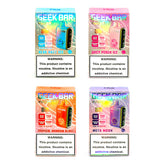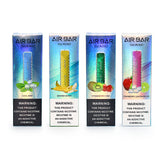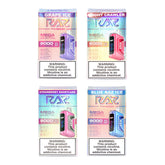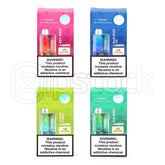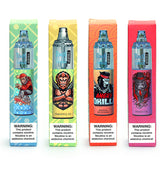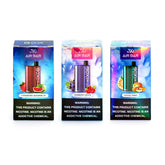NJOY/Altria has requested the court to halt the sale of disposable vape.
On October 19th, Altria's vape subsidiary, NJOY, initiated a federal lawsuit against 34 manufacturers, distributors, and retailers of disposable vaping products, alleging their unlawful sale in California and other regions.
The lawsuit specifically targets brands such as Breeze, Elf Bar, Esco Bar, Flum, Juice Box, Lava Plus, Loon, Lost Mary, Mr. Fog, and Puff Bar. This legal action was filed in the U.S. District Court for the Central District of California, seeking a nationwide injunction to prohibit the import and sale of the mentioned disposable vapes, as well as requesting compensatory and punitive damages to be awarded to NJOY.
NJOY has also issued a warning that additional defendants may be included in the lawsuit, and they are considering further legal actions.
It's worth noting that NJOY, once an independent company that successfully sued the FDA, is now a subsidiary of the tobacco giant Altria Group, known for producing Marlboro cigarettes. NJOY is responsible for manufacturing two of the six FDA-authorized vaping devices currently available. Altria acquired NJOY earlier this year for $2.75 billion, shortly after divesting its 35 percent stake in Juul Labs.
In a seemingly coordinated move, R.J. Reynolds, the manufacturer of Vuse e-cigarettes, also recently filed a complaint with the International Trade Commission (ITC) against a similar group of companies, accusing them of illegally importing unauthorized disposable vapes. The timing of these two legal challenges targeting disposable vapes suggests possible coordination between the two tobacco companies.
Both NJOY and Altria assert that the manufacturers and distributors of these products are selling flavored items in violation of California's ban on flavored vapor and tobacco product in-store sales, which was enacted last year. Additionally, the lawsuit alleges that these disposable products contravene federal laws and are subject to FDA enforcement.
These legal actions, coupled with FDA enforcement efforts and pressure from tobacco control organizations, could potentially drive the disposable vape sector into the underground market. This transformation could shift the current gray market (where products are sold in legal retail stores with taxes paid) into an illegal, unregulated black market. In such a scenario, nicotine vaping products would be sold by individuals and criminal organizations through online and face-to-face transactions, without proper oversight or age restrictions.
For companies like R.J. Reynolds and Altria, which primarily focus on cigarette manufacturing, the elimination of disposable vapes from the market could result in gaining new customers for their Vuse and NJOY products or luring back customers to their Newport, Camel, and Marlboro brands.
Certainly, Altria played a pivotal role in shaping those regulations. At that time, Altria, previously known as Philip Morris, collaborated with Campaign for Tobacco-Free Kids President Matthew Myers and members of Congress to draft the Tobacco Control Act, which was enacted into law in 2009. Altria seized the opportunity to craft a regulatory framework that favored traditional cigarettes and large corporations. This framework would later be used to hinder and create obstacles for manufacturers of lower-risk nicotine products that could potentially compete with Altria and R.J. Reynolds, the dominant American tobacco companies.
Under the Tobacco Control Act, the FDA gained authority to regulate tobacco products, leading to the establishment of the FDA Center for Tobacco Products. Unfortunately, this regulatory body appeared to align itself with the cigarette industry, effectively perpetuating their dominance. One significant outcome of the Tobacco Control Act was the creation of the premarket tobacco application (PMTA) process. Regrettably, the FDA utilized this process to obstruct smaller vaping companies from entering the nicotine market, while allowing all existing tobacco products, including cigarettes, to remain on the market without undergoing thorough review.
Subsequently, the FDA has wielded its authority to exclude independent vaping manufacturers from the market. Notably, the agency has not granted authorization for any vaping products in flavors other than tobacco, nor have they approved any bottled e-liquids. All six vaping devices that have received FDA authorization thus far have ties to major tobacco companies, specifically Altria (NJOY), Reynolds (Vuse), or Japan Tobacco (Logic).
